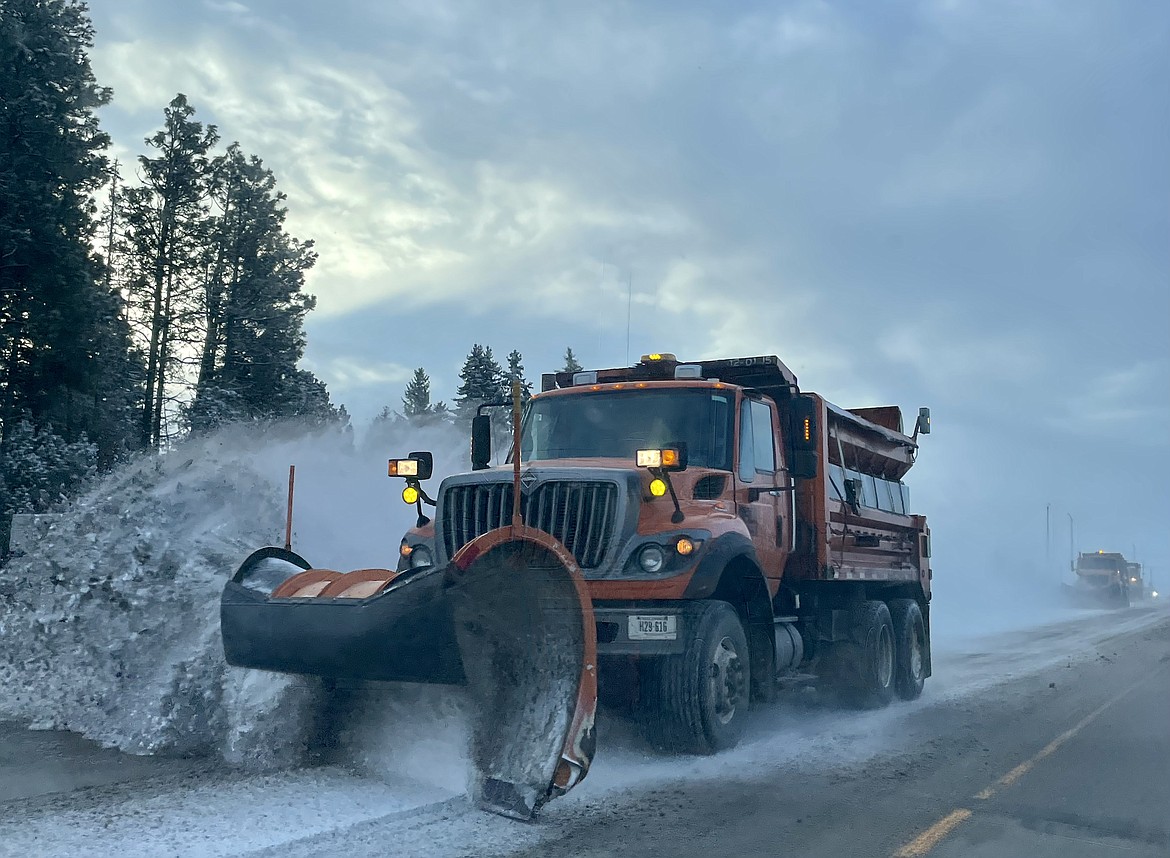Brutal cold, heavy snow bears down on Flathead Valley
Local emergency officials are advising residents to slow down on the roads and take extra precautions before heading out this week as a potentially historic winter storm bears down on the region.
An impressive cold front is expected to spill over the Continental Divide and into the Flathead Valley on Thursday, when the bulk of the heavy snowfall is projected. Kalispell could see over a foot of accumulation by the time the storm moves south. Mountain passes are poised to be buried in 2 feet of snow.
A bout of brutally cold temperatures settle in as the snow tapers off.
“That arctic air will be bringing in some of the coldest air we’ve seen in several decades,” warned Trent Smith with the National Weather Service.
Low temperatures in Kalispell are likely to approach minus 34 by Saturday morning.
The all-time record low for Kalispell is minus 38 set in 1950. According to the National Weather Service forecast, there is a 43% chance that Kalispell dips to minus 39 during this arctic outbreak.
“Ultimately, hitting these record temperatures will depend on snow cover, cloud cover and wind, which remains to be ironed out in the coming day or two,” the Weather Service stated in its Wednesday forecast discussion.
Wind chills, meanwhile, will dip to between minus 30 to minus 50 across Lincoln and Flathead counties by the Friday morning commute.
“If you don’t need to go out when the weather is really bad, don’t,” cautioned Lincoln Chute with Flathead County's Office of Emergency Services.
“The next few days are not the time to take a Sunday drive to see what things look like. The weather is going to be dangerous.”
Chute said drivers need to slow down on snow-covered and icy roads. If a vehicle does slide off and get stuck in snow, drivers should clear the area around the vehicle's exhaust pipe while they wait for help.
He also cautioned residents to take it easy when shoveling snow.
“Anytime we have a lot of snow like this we end up having a lot of heart attacks,” he said. “Take it easy, take it slow.”
Pets should be given extra attention and brought inside as the temperature dips below zero.
While school days are rarely canceled due to winter weather in Northwest Montana, extreme cold can be one reason classes are called off.
In Whitefish, Superintendent Dave Means noted that cold temperatures can affect buses and other school building operations.
“Many times closures occur due to transportation challenges: buses unable to run, severe road conditions, emergency only travel and/or road closures,” Means wrote in a message sent to staff and students. “School closure decisions are based on the safety of our students and staff.”
Flathead County Superintendent of Schools posts each district’s closures online at flathead.mt.gov/department-directory/schools/emergency-school-closures.
Flathead Electric Cooperative noted that while extreme cold isn’t a common cause of power outages, it can delay power restoration efforts.
“Cars hit power poles nearly every day, winds blow and trees fall down, and small animals and birds damage electrical connections — anything can happen,” the co-op wrote in a message to customers Wednesday.
The co-op offered the following tips to prepare for the coming storm:
• Make sure you have an alternate heat source, and keep it prepared, i.e., source and properly store kerosene for your heater; candles; and wood, gas, or pellets for stoves.
• If it is not possible for you to have an alternate heat source, make a plan to go to an alternate location, such as the home of a friend or family member with an alternate heat source.
• Stock up on water for your family and your animals! Whether you buy it bottled or do it yourself, keep in mind that electric water pumps don’t work when the power is out. Store your water supply where it won’t freeze.
• Lay in ready-to-eat food supplies, and remember infant formula and food for your animals.
• Charge up your devices, and put your flashlights, batteries, power banks, lanterns, and radios in an easy-to-access location.
• Top off your gas tank. Most gas stations rely on electricity to operate their pumps, and you might need to use your vehicle as a charging or warming station in an emergency.
• Prepare your home for cold temperatures. Seal drafts, insulate pipes, and install carbon monoxide detectors with battery backups on every level of your home.


